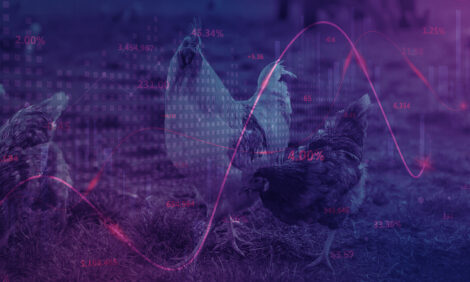



Impact of Canadian Ethanol Policy on Canada’s Livestock and Meat Industry 2012
Ethanol has already contributed to the downsizing of the Canadian livestock industry through its impact on margins and livestock prices, and expansion of the ethanol industry will amplify the negative consequences, according to Kevin Grier (Senior Market Analyst), Al Mussell (Senior Research Associate) and Irena Rajcan (Research Analyst), all with the George Morris Centre in Guelph, Ontario, Canada.Executive Summary
The federal government in Canada and provincial governments have developed policies for biofuels as part of a green fuels strategy to reduce petroleum fuel consumption and associated emissions. To date, the anchor of biofuel policy initiatives has been ethanol made from corn in eastern Canada and made from wheat in western Canada. At least $250 million is spent annually by federal and provincial governments to provide financial support to the ethanol industry. The financial support takes the form of capital and operating subsidies to ethanol operations and firms. In addition, the industry is supported by mandates at the federal and provincial level that dictate ethanol usage in gasoline. Finally, the industry is protected from foreign competition through a tariff.
This study develops a comprehensive understanding of the prospective impact that federal and provincial ethanol policies have on the Canadian livestock industry. It is expected that this research will help governments assess the merits of forthcoming ethanol policy strategies.
The ethanol industry has become a major user of grains in Canada. This has not occurred in a vacuum. It is generating consequences that could be predicted by economic theory. That is, this industry that is created by government policy results in a stimulant to local Canadian grain demand and higher local grain prices than would have otherwise been the case. In addition, due to government subsidies, the ethanol industry has an advantage in the competition for feed grains relative to other buyers, such as the livestock industry. Most importantly the government mandated use of ethanol, currently at 5 per cent of gasoline, creates an inflated demand for the product. As a result, ethanol policy has had impacts on the Canadian grain markets and on other users of grain, such as the Canadian livestock and meat industry.
It is acknowledged that over the past five years, the cattle and hog industries in Canada have undergone a great deal of financial stress. The Canadian dollar appreciation, the increase in global grain prices, animal health challenges and trade disputes have all negatively impacted the industry. As a result of these challenges, there is a tendency to overlook the impact of Canadian ethanol policies. It is also argued that the ethanol policies of the US are much more important to Canadian grain prices. This paper, however, makes the case that Canadian ethanol production and policies have a very crucial role in local grain prices. As a result of ethanol’s local impact on grain prices, there is a related impact on local Canadian livestock and meat production prospects. Again, there are many factors that influence grain and livestock prices. This paper argues, however, that Canadian ethanol policies also have a direct and important negative influence on the Canadian livestock industry.
The data and statistical analysis in this report back up the theory and common sense assertions of the impact of ethanol on livestock production in Canada. The data show the following:
- Canadian ethanol production increases the price of feed grains in eastern and western Canada by about $15-20/tonne and $5-10/tonne respectively.
- Canadian ethanol production resulted in reduction in livestock feeding margins and or increased losses for Canadian producers amounting to about $130 million per year.
- Canadian ethanol production resulted in lower feeder livestock prices for Canadian producers.
- Canadian ethanol production resulted in increased exports of feeder animals that could have been fed by Canadian producers.
- Canadian ethanol production resulted in reduced incentives for livestock production in Canada.
- Expanded use of ethanol to a 10 per cent mandate will result in a serious reduction in feed availability in eastern Canada. This will result in a dramatic reduction of cattle and hog feeding in eastern Canada.
The bottom line is that ethanol has already contributed to the downsizing of the Canadian livestock industry through its impact on margins and livestock prices. Expansion of the ethanol industry will amplify the negative consequences.
Arguments have been made that given relatively lower grain prices in Ontario and the West compared to the US during 2010 and 2011, that ethanol is not a threat to livestock. This argument, however, is simply based on a fortuitous increase in production relative to demand in Canada compared to the US. Furthermore, even in these circumstances, the data and economic theory still demonstrate a negative livestock impact. That is, a point in time argument does not outweigh the ongoing impact of ethanol locally in Canada.
It is important to once again emphasize that the strengthening in the grain basis due to Canadian ethanol policy, rather than the world price of grain, is the driver of these developments. Ethanol policy in Canada, not the US policy, is having and will have far-reaching effects in terms of adjustments in the location of livestock feeding and meat production, and the associated economic development associated with them.
As biofuel policy evolves it is important that governments and industry understand these implications on livestock and meat development. Looking to the future, it is crucial for the livestock and meat industry that the policies and programmes sustaining the ethanol industry be curtailed or eliminated. Most importantly, the federal government needs to carefully weigh the impact of allowing the ethanol industry to move to a 10 per cent blended mandate. Furthermore, federal and provincial programmes that provide capital grants for additional plants and capacity in the industry need to be reconsidered. Governments must recognize the significance of the Canadian livestock and meat industry, and that it is vulnerable to expansions in ethanol policy.
Government has demonstrated that in a short time, it can create a large ethanol industry. The same cannot be said for the livestock and meat industry. Governments must realize that once the red meat industry develops over a long period of time; if it were to drastically decline or vanish in some regions, it would take a very long time to return.
Further Reading
| - | You can view the full report by clicking here. |
February 2012








